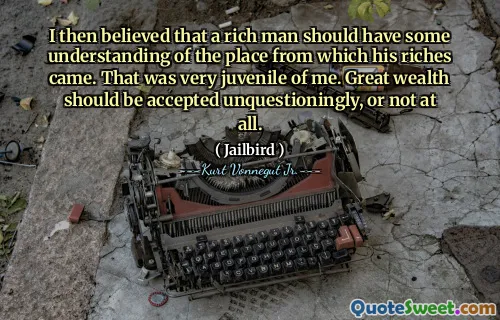Jailbird, a novel by Kurt Vonnegut, unfolds the story of Walter F. Starbuck, a former corporate executive who has served time in prison for his involvement in a Watergate-like scandal. The narrative dives into the complexities of his life, reflecting on themes of politics, capitalism, and the nature of freedom. Through Starbuck's journey, Vonnegut paints a satirical picture of American society, exposing the absurdities and injustices inherent in the system.
The novel intricately weaves together a diverse cast of characters, each representing different facets of society, from idealistic activists to corrupt businessmen. Starbuck interacts with these individuals, revealing the deep-seated connections between personal choices and larger societal issues. Vonnegut's trademark dark humor shines through, adding depth to the often grim exploration of morality and ethics.
Throughout Jailbird, the narrative shifts between past and present, illustrating how Starbuck’s experiences shape his worldview. Vonnegut emphasizes the significance of individual actions within the broader political landscape, ultimately suggesting that hope and change are possible, even amidst chaos. The novel serves as a poignant critique of capitalism and a reflection on the human condition, making it a thought-provoking read that resonates with contemporary readers.
More »
Today Birthdays
1942 -
Stephen Hawking
1944 -
Terry Brooks
1943 -
Charles Murray
1935 -
Elvis Presley
1947 -
David Bowie
1969 -
R. Kelly
1929 -
Gerry Spence
1902 -
Carl Rogers
1337 -
Giotto di Bondone
1888 -
Richard Courant
1926 -
Soupy Sales
1957 -
Amanda Burton
1867 -
Emily Greene Balch
1821 -
James Longstreet
1987 -
Freddie Stroma
1980 -
Sam Riley
1980 -
Rachel Nichols
1981 -
Genevieve Padalecki
1823 -
Alfred Russel Wallace
1979 -
Sarah Polley
1982 -
Gaby Hoffmann
1939 -
Carolina Herrera
1958 -
Betsy DeVos
1965 -
Michelle Forbes
1973 -
Sean Paul
1924 -
Ron Moody
1885 -
A. J. Muste
1987 -
Cynthia Erivo


